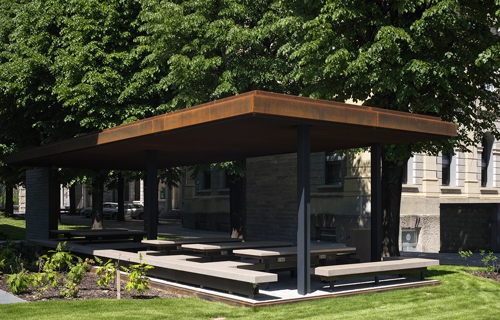Strategic Programmes
Polimi CO2 Emissions Mitigation Plan outlines the methodological framework for the definition and verification of the University’s CO2 emission reduction commitments. ViviPolimi project is focused on improving the quality of Politecnico campuses implementing multiple actions of regeneration of open spaces. Within and alongside these strategic programmes, climate action activities at Politecnico di Milano can be divided into two main categories:
Activities for raising awareness

Politecnico di Milano, within the RUS Climate Change Working Group, promotes initiatives in order to raise the awareness both internally and externally the University community. These include:
Greenhouse gas emission inventories meeting
Climbing for Climate
Adaptation interventions

The University has developed several projects for the redevelopment of the external areas. These are aimed at mitigating climatic stress in extreme summer temperatures. The two main projects are:
ViviPolimi@Green
Bonardi Campus regeneration
Climate Change Mitigation
The course deals with the different aspects of the global climate change problem, with the aim of providing the necessary elements for the design and evaluation of mitigation policies. To achieve this goal, the phenomenological bases of the problem are deepened, showing the origin and magnitude of the different anthropogenic forcings, as well as the expected short and long term impacts on the different environmental compartments.
This course is delivered in the following Degree Programmes:
Environmental and Land Planning Engineering
Climate and Global Changes in the Age of Sustainable Development
Aim of this course is to discuss from the perspective of sustainable development the great environmental, economic and social challenges that humanity is facing in the contemporary era. The verb "discuss" is utilized deliberately to emphasize the interactive mode used throughout the course. Each and all of the problems are treated up to a global (planetary) scale and over long (from decennial to secular or even millennial) temporal scales. Particular attention is given to climate change and its consequences along many directions claiming for sustainable solutions, from agricultural and ecological dynamics to human and Earth health.
This course is delivered in the following Degree Programmes:
Environmental and Land Planning Engineering
GEO FUNDAMENTALS
This course offers a broad overview of the fundamental characteristics of the physical environment of the Earth. It is specifically aimed to describe the main processes regulating our planet's functioning systems, as well as the phenomena that emerge from their interactions. Special emphasis is placed on Earth observation via remote sensing as a tool to describe and understand global patterns and global change.
This course is delivered in the following Degree Programmes:
Geoinformatics Engineering
SUSTAINABLE DEVELOPMENT
Climate change, related global warming, and the unsustainable use of natural resources require attention and a change of paradigm, including in scientific and engineering communities. Within the framework of “Innovative Teaching”, this course aims at introducing the students to the concept of sustainable development, helping them to understand and evaluate the related global challenges, and deploy both theoretical and modelling skills to tackle them both at the firm- and the country-level.
This course is delivered in the following Degree Programmes:
- Electrical Engineering
- Chemical Engineering
- Engineering Physics
- Nuclear Engineering
PROGETTAZIONE TERRITORIALE PER LA GESTIONE DEI RISCHI
The course introduces the tools to operate in the field of Disaster Risk Reduction with particular reference to medium-long term interventions ("deferred" time), both to improve the safety levels of existing territorial assets and to apply the most correct planning and design criteria in new initiatives.
This course is delivered in the following Degree Programmes:
Architecture - Building Architecture
DEEP DEMONSTRATIONS OF HEALTY AND CLEAN CITIES - MILANO
The goal of the EIT-Climate-KIC Deep Demonstrator Milano (DDMI) project is to contribute to the reduction of the carbon footprint of the city of Milan and to the achievement of the “Carbon Neutral City” target by 2050. The DDMI project operates in support of the Air Climate Plan (PAC) of the Municipality of Milan, the PAC aims at reducing air pollution, protecting health and the environment, and responding to the climatic emergency.
Scientific Coordinator: Giuliana Gemini (Poliedra)
CROWD4SDG - CITIZEN SCIENCE FOR MONITORING CLIMATE IMPACTS AND ACHIEVING CLIMATE RESILIENCE
The goal of the EU H2020 Crowd4SDG - Citizen Science for Monitoring Climate Impacts and Achieving Climate Resilience is to research how citizen science can provide data for tracking progress towards the Sustainable Development Goals and to study how grassroots innovation can help achieve such progress.
Scientific Coordinator: Barbara Pernici
MODFABE
MODfabe - Modelling individual farmer behaviours in Coupled Human Natural Systems under changing climate and society aims to increase the robustness of decision-making processes in Coupled Human-Nature Systems (CHNS) by modelling farmers’ perception and adaptation capacity to climate change. Considering that climate change and water resources management represent two necessarily interdisciplinary topics in which the natural and social sciences must be integrated, the MODFABE’s core is to combine observational data (farmers’ perception) into simulation models to increase the rationality of farmers’ interventions in the decision-making processes based on multiple competing purposes and a multiobjective context.
Scientific Coordinator: Andrea Castelletti

